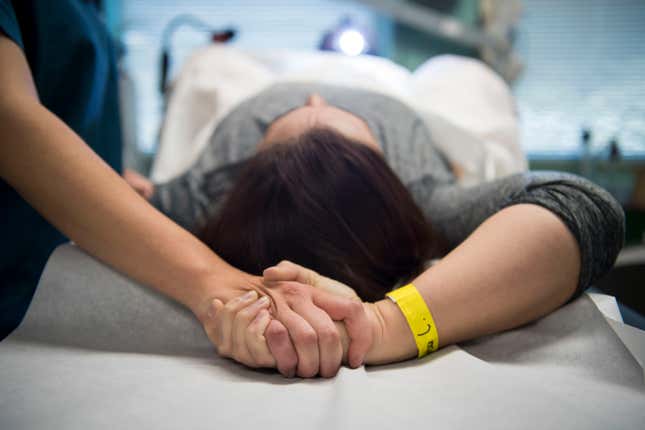Louisiana Woman Was Subjected to ‘Painful, Hours-Long’ Labor to Birth Dead Fetus
The doctor said the patient was “screaming—not from pain, but from the emotional trauma she was experiencing."
AbortionPolitics

Add this to the ever-growing list of traumatic, post-Roe v. Wade horror stories unfolding across the country in the three weeks since the Supreme Court decision dropped: One Louisiana woman was apparently forced to endure a “painful, hours-long labor to deliver a nonviable fetus, despite her wishes and best medical advice,” because her doctor wasn’t allowed to perform a dilation and evacuation (D&E) abortion (the safest form of second-trimester abortion).
According to an affidavit filed by the woman’s doctor, Valerie Williams, throughout the delivery, Williams’ patient was “screaming—not from pain, but from the emotional trauma she was experiencing.” This patient already had to grapple with the devastating news that her pregnancy wasn’t viable; on top of this, she was then forced to birth a dead fetus.
Following the delivery, it took hours for Williams’ patient’s placenta to deliver, prompting her to hemorrhage nearly a liter of blood before Williams was able to stop the bleeding, the affidavit claims. Nonetheless, the hospital’s lawyer barred Williams from providing abortion care, which Williams says would have “lasted approximately 15 minutes,” because the incident occurred after Louisiana’s trigger ban temporarily went into effect for a few days starting on July 8.
“There was no way for the pregnancy to continue without putting the patient’s health at risk, as the fetus was already starting to deliver,” Williams wrote. She added, “Going back into that hospital room and telling the patient that she would have to be induced and push out the fetus was one of the hardest conversations I’ve ever had.”
Williams’ affidavit comes as a Louisiana judge weighs whether to allow the state’s trigger law, which bans abortions with almost no exceptions, to take effect. On Monday, the judge temporarily extended an order that blocks the law, meaning abortion is legal in Louisiana right now. But the judge didn’t go so far as to grant a preliminary injunction, leaving patients and abortion seekers in an ongoing state of limbo.
-

-

-

-

-

-

-

-

-

-

-

-

-

-

-

-

-

-

-

-

-

-

-

-

-

-

-

-

-

-

-

-

-

-

-

-

-

-

-

-








































